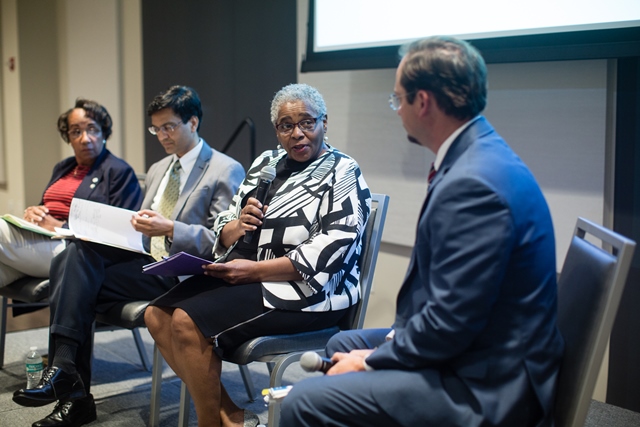Three health industry leaders from Memphis offered complementary perspectives in a recent panel discussion at the Halloran Center, as part of the BlueCross diversity scholarship presentation.
But they all started from a point of strong agreement – health disparities exist.
“You’ll find some who argue they don’t,” explained Dr. Manoj Jain, an infectious disease specialist, writer and educator. “But they’re wrong.”
Dr. Altha Stewart, associate professor at UTHSC and president-elect of the American Psychiatric Association, agreed, noting, “ZIP code can dictate a person’s health status.”
Jain argued that accepting their existence is a critical first step toward making change, followed by the need for better measurement and communication.
Renee Frazier, retired CEO of Common Table Health Alliance, noted in her opening remarks that minorities, and African-Americans in particular, have higher prevalence rates for almost every disease.
Throughout the discussion, moderated by BlueCross Chief Operating Officer Scott Pierce, the panelists addressed factors driving health disparities, along with potential solutions.
Starting with the basics
Frazier outlined the goal she believes in: health equity. She described equity as an “ideal state,” where people have an equal opportunity to reach their full health potential, without being disadvantaged because of socioeconomic factors, or their race, ethnicity or gender.
That reality doesn’t exist today, Frazier explained, primarily because of factors known as the social determinants of health.
The federal government’s Office of Disease Prevention and Health Promotion defines them as “conditions in the environments in which people live, learn, work, play, worship, and age that affect a wide range of health, functioning, and quality-of-life outcomes and risks.” These factors are broken into five main categories:
- Economic stability
- Education
- Social and community context
- Health and health care
- Neighborhood and built environment
Frazier noted that people need a level playing field – including good, affordable housing and healthy food – before they can best manage other kinds of health care needs.

“Social determinants happen outside the provider’s office,” Frazier said, but they make their way in when a person needs care.
Dr. Jain also spoke about how unconscious bias and cultural stereotypes can play a role in how people get medical care – even citing a personal example of being on the receiving end of an untrue judgement based on his ethnicity.
Addressing mental health misperceptions
Dr. Altha Stewart discussed how mental health plays a role in physical health, calling them “silent travelers of mental illness” because they are so often correlated with diseases like diabetes and hypertension – and are sometimes ignored as potential root causes.
Too often, Dr. Stewart said, minorities don’t get mental health treatment early enough, which leads to more intensive (and more expensive) treatment down the road. She urged a broader discussion on providing better mental health training for other kinds of health care professionals – especially primary care physicians, who could help identify needs and refer patients for treatment.
Dr. Stewart also spoke about the need to “dispel myths” about mental health in minority communities, which are another factor in delayed treatment. As an example of progress, she cited the work of a Memphis group that trained “credible community messengers” to help combat the stigma associated with seeking mental health care.
Role models and leadership participation make a difference
The panelists agreed on a need for better representation of minorities in health care fields, especially in leadership roles.
Frazier noted that leadership participation is crucial because it helps bring perspectives on health disparities to the forefront. People who haven’t lived with those realities among their friends and families may not be aware of existing differences and needs.
Frazier and Dr. Stewart both spoke about the need for role models and mentors, which is important to help young people in minority communities see opportunities for themselves in the health care field.
Future health care leaders get a hand up
Following the panel discussion with Frazier, Dr. Jain and Dr. Stewart, the program turned toward three aspiring health care professionals.

BlueCross leaders officially awarded Takiyah Best (University of Memphis), CheKenna Fletcher (Tennessee State University) and Tanzie Nguyen (University of Tennessee) with $10,000 scholarships to continue their studies in health care-related fields.
On stage, each shared how their families influenced their decisions to enter the health care field and spoke about their goals in a discussion led by BlueCross Chief Medical Officer Dr. Andrea D. Willis.

All three were selected because of their academic achievements and community service efforts.
The annual diversity scholarships are funded by the BlueCross BlueShield of Tennessee Health Foundation to help address underrepresentation of minorities in the health care industry, and the recipients were chosen in a rigorous process managed by the Memphis Chapter of the National Association of Health Service Executives.


 John leads a team responsible for communications and community relations strategies that reflect the mission-driven culture of BlueCross. He has called the Chattanooga area home since 2003 and began serving on the BlueCross corporate communications team in 2010.
John leads a team responsible for communications and community relations strategies that reflect the mission-driven culture of BlueCross. He has called the Chattanooga area home since 2003 and began serving on the BlueCross corporate communications team in 2010.